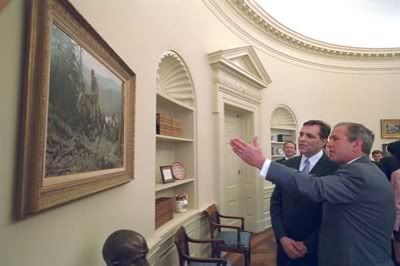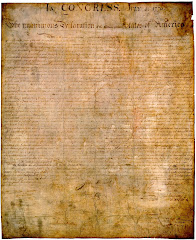 Review
Review
America’s leaders have gone from hubris to waking fantasy, according to this caustic critique of the Bush administration’s foreign policy. Kaplan (
The Wizards of Armageddon) argues that the Cold War’s end and 9/11 persuaded President Bush and his advisers to unilaterally impose America’s political will on the world, while remaining blind to the military and diplomatic fiascoes that followed. Rumsfeld’s "Revolution in Military Affairs," a doctrine touting supposedly omnipotent mobile forces and high-tech smart weapons, convinced Pentagon officials that Iraq could be pacified without a large force or a reconstruction plan. Bush abandoned Clinton’s diplomatic rapprochement with North Korea, then stood by as Kim Jong-Il built nuclear weapons. And imbued with a "mix of neo-conservatism and evangelism" that was peddled most flamboyantly by Israeli ideologue Natan Sharansky, Bush backed clumsy pro democracy initiatives that backfired by bringing anti-American and sectarian groups to power in the Middle East. Eschewing Kaplan’s favored approach of fostering international security through alliances and consensus building, Bush assumed that "by virtue of American power, saying something was tantamount to making it so." The particulars of Kaplan’s indictment aren’t new, but his detailed, illuminating (if occasionally disjointed) accounts of the evolution of the Bush administration’s strategic doctrines add up to a cogent brief for soft realism over truculent idealism.
(Feb.) (
Publishers Weekly, November 12, 2007)
Book DescriptionAmerica's power is in decline, its foreign policy adrift, its allies alienated, its soldiers trapped in a war that even generals regard as unwinnable.
What has happened these past eight years is well-known.
Why it happened continues to puzzle. In
Daydream Believers, celebrated
Slate columnist Fred Kaplan combines in-depth reporting and razor-sharp analysis to explain just how George W. Bush and his aides got so far off track -- and why much of the nation followed.
For eight years, Kaplan reminds us, the White House -- and many of the nation's podiums and opinion pages -- rang out with appealing but deluded claims: that we live in a time like no other and that, therefore, the lessons of history no longer apply; that new technology has transformed warfare; that the world's peoples will be set free, if only America topples their dictators; and that those who dispute such promises do so for partisan reasons. They thought they were visionaries, but they only had visions. And they believed in their daydreams.
"In his
Slate chronicles through the Iraq War years, Fred Kaplan consistently outshone other analysts with his explanations of what was going wrong and why. In this engrossing and completely new work, he tells the story of the little-known theorists who have shaped much of the world's recent history. For me this book was full of revelations."--James Fallows, National Correspondent,
The Atlantic Monthly"This is the inside history of our time, told with precision and confidence by an author who knows where the secrets are kept -- and also that the most powerful and dangerous weapon in Washington, D.C., is a new idea." --Thomas E. Ricks, author of
Fiasco: The American Military Adventure in Iraq and
Making the Corps
 Sanford Levinson is very upset. As he sees it, the United States Constitution fails to uphold the principles of the American nation, and something needs to be done about it. Our Undemocratic Constitution is his case for a national referendum on calling a new constitutional convention to revise the Constitution to bring it into the 21st century.
Sanford Levinson is very upset. As he sees it, the United States Constitution fails to uphold the principles of the American nation, and something needs to be done about it. Our Undemocratic Constitution is his case for a national referendum on calling a new constitutional convention to revise the Constitution to bring it into the 21st century.










